Best Practice Dissemination and Sustainability
This award recognises people and teams who have been recognised within Quality in Care Diabetes. They will have successfully disseminated and sustained their best practice for a minimum period of two years for the ultimate benefit of people with diabetes and/or their families and carers.
Winner
The Evolvement and Expansion of the DICE Programme
Ipswich Hospital, East Suffolk and North Essex NHS Foundation Trust
The Diabetes Inpatient Care and Education (DICE) programme won a QiC award for Best Improvement in Quality of Inpatient Care Initiative in 2015, and after this sought to build on these results. The programme demonstrated reduced harm to people with diabetes in Ipswich Hospital after establishing a fully staffed, proactive inpatient diabetes team focused on improving care through staff education, and new systems of care. Among the new initiatives is the “Perioperative Passport” aimed at improving the experience of people with diabetes undergoing elective surgery and reducing length of stay. After a successful pilot, charity funds were used for expansion, including the recruitment of a perioperative diabetes specialist nurse (DSN) and rollout of a perioperative and day case booklet.
Highly commended
North East Essex Diabetes Service – Service Redesign
Suffolk GP Federation
There are over 19 000 people with diabetes in North East Essex, with a prevalence 5.6% higher than the national average. Suffolk GP Federation has delivered a new, clinically led, integrated model of care under the North East Essex Diabetes Service. Launched in 2014, the aim was to improve diabetes outcomes, moving the region from the bottom to the top quartile within five years. The model has seen diabetes care transferred away from hospitals into a community setting, including a new role for consultants, supporting GP practices and providing governance. Services are now easier to access and understand for patients, which has led to better outcomes and improved self-management.
Commended
Improving Outcomes for Families through the “Type 1 Kidz” Project
Investing in Children
Investing in Children (IiC) has established the Diabetes Project for children and young people (CYP) with type 1 diabetes in Co. Durham and Darlington to help them build confidence in managing their condition. The monthly group session named Type 1 Kidz has created a forum for them to meet, take part in activities and learn from each other. IiC has now secured funding until 2020, and the project has spread out across the region. There have been many examples of improved health outcomes, with CYP encouraged to become resilient, confident young people and adults who can manage diabetes well throughout their lives and have improved long-term outcomes.
Finalist
Expanding the Reach of the Cambridge Diabetes Education Programme (CDEP)
Cambridge Diabetes Education Programme
The Cambridge Diabetes Education Programme (CDEP) is a competency-based online diabetes platform supporting both specialist and non-specialist diabetes healthcare professionals to demonstrate the skills relevant to their role through continuing professional development (CPD). CDEP is built on the UK national diabetes competency frameworks and utilises adult education principles and Miller’s Pyramid of Competency to underpin its functionality. After training, 90% of those taking the course rated their knowledge of inpatient foot care as ≥6/10, compared to just 64% of untrained staff, with 98% rating their confidence in assessing the diabetic foot as ≥6/10 compared to 72% of untrained staff.
Diabetes Team Initiative of the Year – Adults
Teamwork plays a critical and growing role in high-quality diabetes care. This award recognises the value of outstanding multidisciplinary team achievements and contributions that help better prevent, diagnose or treat diabetes and support self-care management to improve the experience and outcomes for adults with diabetes and/or their families/carers.
Highly commended
Virtual Ward, Innovation and Collaboration, Improving Diabetes Care in the Community
North East Essex Diabetes Service
The Virtual Ward (VW) was initiated because of the high number of housebound patients with diabetes who required daily community nurse (CN) visits to administer insulin, but for whom diabetes control remained poor. The North East Essex Diabetes Service and Anglia Community Enterprise worked collaboratively in the VW to review each patient’s individual needs, resulting in improved outcomes, quality of life and reduced CN visits, saving hundreds of hours of CN time, all of which have brought financial benefits to the local NHS. This project has also led to closer working relationships with the wider community team.
Commended
Developing a Team Approach to Improve Insulin Safety and Reduce Insulin Wastage
Northern Devon Healthcare Trust
An Inpatient Diabetes Awareness (IDA) project was launched in 2015, as the existing link nurse model was ineffective. A 12-month programme was developed to enable the diabetes specialist team to audit different aspects of diabetes management and care on each ward, highlight areas going well and review those that required education and improvement. Among the topics audited was insulin safety and wastage. Themes identified included insulin safety (ward stock management), safe administration of insulin, patients’ own insulin (waste reduction), staff education and training, multidisciplinary team working, patient transfer/discharge, insulin wastage and patient experience. The project has improved inpatient diabetes care through increased staff knowledge and awareness, improved efficiency, reduced insulin omission and reduced incidents.
Patient Care Pathway, Generic or Specialist
An efficient patient care pathway is critical to empower self-management and avoid unnecessary complications. Based on patient needs and goals, the focus of the patient care pathway is to improve the quality and delivery of effective integrated services that are based in the community and/or in hospital.
Winner
The DIADEM Project: Improving the Management of Diabetes and Dementia
Sandwell and West Birmingham NHS Trust
The combined comorbidity and cost of diabetes and dementia is increasing, but current evidence, especially clinically relevant studies, is poor, with no clear understanding of “real-world” management.
The DIADEM project was devised to address the knowledge gap in managing people with diabetes and dementia. The aim was to assess all patients admitted with both conditions and focus on medication review, de-intensification or simplification, and an individualised care plan.
Highly commended
The Cornwall Community Pharmacy Patient Activation Service – Type 2 Diabetes
Cornwall Local Pharmaceuticals Committee
“Patient activation” describes people’s knowledge, skills and confidence to manage their own health. Scores are closely linked to clinical outcomes, costs of healthcare and patient experience. NHS England purchased Patient Activation Measure (PAM) licences to be used in Vanguard sites across the county to measure patient activation. Cornwall (NHS Kernow CCG) partnered with the NHS South West Cardiovascular Clinical Network and the Cornwall & Isles of Scilly Local Pharmaceutical Committee to pilot a PAM service in community pharmacies in Cornwall for patients with type 2 diabetes.
A total of 315 patients were recruited to the service; 234 completed the full intervention, 29 formally withdrew and the remainder were lost to follow-up. Of those who completed the service, 98% either achieved (72%) or partially achieved (26%) their goals. PAM scores increased in 77% of patients by a mean of 8.64 points.
Commended
A 3-Year Experience of Sandwell and West Birmingham Patient-Centered Collaborative Diabetes Model – The Way Forward?
Sandwell and West Birmingham NHS Trust
Sandwell and West Birmingham CCG has a substantial ethnic minority; a socially deprived, non-compliant population; and high rates of diabetes, as well as disjointed diabetes management between the community and hospitals. The CCG, in collaboration with secondary care providers Sandwell and West Birmingham Hospital Trust and Birmingham Community Healthcare, commissioned the previously mentioned Diabetes in Community Extension (DICE) community diabetes service. The CCG also commissioned a Diabetes Local Improvement Scheme to complement the DICE service in primary care. In the last three years, nearly 5000 patients have been seen in DICE clinics, resulting in 2500 fewer outpatient appointments. The DICE model has upskilled primary care staff, delivered effective care closer to the patients’ homes, improved satisfaction and brought significant cost savings.
Diabetes Collaboration of the Year – Adults
This award recognises outstanding collaborative projects that demonstrate working with internal and external stakeholders to achieve a common goal, i.e. initiatives created and implemented by multiorganisational partnership; for example, work carried out by teams comprising the NHS, charities, social care, etc. that significantly contribute to self-management, avoidance of complications and treatment of diabetes.
Winner
Blood Glucose Monitoring – A Collaborative Approach to Updating the Formulary
NHS Birmingham and Solihull CCG and partners
Rising spending on blood glucose meters and testing strips in Birmingham, Solihull, Sandwell and Environs (BSSE) required action. The local Diabetes Medicines Management Advisory Group reviewed all glucose/ketone monitors, needles and lancets, and also made self-monitoring recommendations. In six months, 170 products were considered and new guidelines were prepared. Subsequent implementation enabled a quick change in practice. The combined potential saving on blood ketone and glucose strips for Birmingham and Solihull CCG for 2018/19 is £661 478, meaning that the NHS budget can be used wisely and reinvested.
Highly commended
Tomorrow’s Leaders: Developing Agents of Change in Diabetes Care
Diabetes UK
Diabetes UK created the Tomorrow’s Leaders programme to give DSNs and dietitians skills and confidence to lead improvements in diabetes care. The programme supports the development of leadership skills and also boosts confidence and motivation of DSNs to develop and deliver high-quality diabetes care.
Feedback from participants has indicated better leadership, more cohesive team working and improved engagement within multidisciplinary teams, leading to better services. Several participants have progressed to other leadership roles within their team or local area.
NHS England Outstanding Contribution Award for Services in Diabetes
This award recognises an individual for their sterling work to improve diabetes care. NHS England are always grateful for the efforts the whole diabetes community put forward to improve care, and this award recognises one individual for their efforts during this year.
Winner
Paru King
Consultant Physician, Derby Hospitals
Dr King has been a Consultant in Diabetes and Endocrinology in Derby since 2000. She is the physician lead for the diabetes and obstetrics service, and has clinically led and project-managed the award-winning PROCEED project, the first integrated service for preconception care.
In 2018, her team was selected as one of 20 quality improvements sites to further improve preconception care. She started the National Diabetes and Pregnancy Conference and has supported its growth into a major annual conference. In addition, she has been the clinical lead for integrated care in Derby City since 2011, and Derby’s service model has gained national recognition.
Since 2017, Paru has led the spread of this innovation from Derby City to the whole of Southern Derbyshire. She was one of the first Diabetes UK Clinical Champions, and the role has helped her achieve service development locally as well as given her the opportunity to be involved in her areas of interest at a national level.
Prevention and Early Diagnosis – Type 2 Diabetes
This category recognises the impact of preventative initiatives to help people and their families and/or carers to live healthier lives and reduce the risk of developing type 2 or gestational diabetes, and of early diagnosis, and diabetes management initiatives to optimise outcomes and reduce complications.
Winner
The Ingeus “Healthier You” National Diabetes Prevention Programme
Ingeus
In 2016, NHS England commissioned Healthier You: the NHS Diabetes Prevention Programme (NDPP). NDPP is an early intervention service designed to support people at risk of type 2 diabetes to make long-standing changes to their health and wellbeing and prevent them developing the condition. Ingeus, in partnership with Leicester Diabetes Centre (LDC), delivers the NDPP in 18 areas across the UK, accounting for 38% of all programme referrals commissioned so far. It is the largest single provider of NDPP services across the country, with over 62000 referrals. It has achieved exceptionally high performance for uptake, retention and participant outcomes (average HbA1c reduction of 4.4 mmol/mol [0.4%] after six months, according to an LDC analysis in February 2018).
Diabetes Education Programmes – Adults
This award recognises those teams and individuals that are working to educate and empower adults to self-manage their diabetes to help those living with diabetes stay as healthy as possible. Programmes may include structured education or other education initiatives influencing clinical, psychological or social wellbeing, and are welcomed from community or clinical settings.
Winner
Enhancing Specialist Knowledge for Pharmacists to Optimise Diabetes Medication Management
North East Essex Diabetes Service
This project focused on upskilling inpatient clinical pharmacists through completing the advanced diabetes management course, followed by a new collaborative working initiative involving regular clinical supervision and support from the North East Essex Diabetes Service inpatient DSNs. The project demonstrated that clinical pharmacists were able to improve medication safety through medication reviews, highlighting and identifying any clinical risks, and optimising patient therapy. They gained skills and confidence to support diabetes management at the ward level, leading to improved patient safety and reduced DSN workload, plus greater diabetes awareness and knowledge within the hospital.
Highly commended
Diabetes.co.uk – Low Carb Program
Diabetes.co.uk
The Low Carb Program, launched in November 2015, is a 10-week, automated, structured health intervention for adults with type 2 diabetes, prediabetes and obesity. Each patient’s journey is personalised through an AI-led engagement pathway. The programme was developed in collaboration with Southport GP Dr David Unwin (NHS Innovator of the Year 2016) and the feedback of 20 000 people with type 2 diabetes who completed a 54-question survey. Responses highlighted gaps in education. The forum takes account of patients’ personal goals, demographics, culture, associated comorbidities, food preferences and budgets to influence changed lifestyles. It is accessible via mobile, PC or app. It has raised the credibility and scientific understanding of type 2 diabetes remission. Over 326 324 people have downloaded the programme in 195 countries around the world.
Commended
Talking about Diabetes (TAD) – Inspiration and Motivation for Diabetes
Talking About Diabetes
Talking About Diabetes (TAD) talks were set up to provide an opportunity for people with type 1 diabetes to share their own inspirational stories in order to encourage, empower and motivate others who have diabetes or care for someone with the condition. When asked about outcomes and how they felt after attending the event, 82.6% of respondents reported that they were more positive about living or supporting someone with type 1 diabetes, 69.6% were more motivated to achieve goals and 58% felt more connected with a local network of like-minded people.
Commended
Film Prescriptions: A New Method for Delivering Patient Empowerment and Education
Prince Philip Hospital/Hywel Dda
Film prescriptions produced by behaviour- change media experts and developed by health professionals and patients in Wales have been deployed nationally. Over 30 films are now available for prediabetes, type 1, type 2 and gestational diabetes, covering all aspects of diabetes care. They were recently incorporated into the National Direct Enhanced Service (NDES) for Diabetes in Wales and are viewed by approximately 1000 patients each month. Initial evaluation of the system demonstrated improvement in glycaemic control, as measured by HbA1c.
Finalist
Exercise Classes for People with Diabetes with Specialist Nurse Support
University Hospital Plymouth NHS Trust
This diabetes team identified a gap in the care provided for patients in terms of exercise provision. In collaboration with the Sports Development Team at Plymouth City Council, a low-cost, weekly circuits group for people with diabetes, with DSN support, was established.
The project is being evaluated with the aim of expanding it to offer further exercise classes and support to all patients. Responses have been positive, with participants reporting anecdotally increased fitness, weight loss, medication reductions (both diabetes and blood pressure medication), and increased activity levels and overall health.
Judges’ Special Award
The Judges’ Special Award (not enterable directly) is judged from all entries received, irrespective of category, for a project that the judges feel deserves national recognition and a platform to be shared with the wider diabetes community.
Winner
Setting the Trend for Diabetes Nursing in the Future
TREND-UK
Training, Research and Education for Nurses in Diabetes UK (TREND-UK) was launched in 2010. Since then, it has become a conduit for nursing views from groups such as the Diabetes Inpatient Specialist Nurses Group, the Practice Nursing Group and the Nurse Consultant Group. The team is recognised for providing high-quality, practical resources for both diabetes clinicians and people with diabetes. TREND-UK is also known for developing high-quality, free-to-attend educational meetings and is recognised as a “diabetes brand”.
The judges commented: “TREND is a fantastic achievement. All four diabetes nurse consultants are in full-time posts and in a decade have shaped an organisation that raises the profile of DSNs and provided a fantastic range of resources. TREND has not only produced a lot of high-quality material, but the application suggests they are continuously moving forward looking at new collaborations and areas of development.”
Highly commended
Changing the Landscape for Delivery of Type 2 Diabetes Care – Midland Diabetes Structured Care Programme 1999 – 2017
Midland Diabetes Structured Care Programme
The HSE Midland Diabetes Structured Care Programme is the longest-established primary care-based diabetes care programme in Ireland. Participating practices receive clinical support via diabetes nurse specialists, dietetics and podiatry/chiropody, plus educational and administrative support.
While the proportion of people with type 2 diabetes achieving HbA1c <48 mmol/mol (6.5%) remained stable over time, there was evidence of a significant increase in the proportion of patients meeting the total cholesterol target of <4.5 mmol/L (22.9% in 1999 vs 70.4% in 2016) and triglycerides <2.0 mmol/L (46.4% vs 75.5%).
The judges commented: “This project has benefited from a strong leader who has managed to improve quality under extremely challenging conditions, e .g. lack of access to dietetic resources and no consultant resource. It is a remarkable achievement that something that started off being supported by funds from drug savings has become part of the national cardiovascular disease secondary prevention programme.”
Commended
VRIII: Getting it Right with JBDS-Recommended Fluid
Queen Elizabeth Hospital Birmingham
Variable rate intravenous insulin infusions (VRIIIs) are frequently used to manage blood glucose in inpatients. However, they are often used inappropriately and are associated with significant harm to patients.
Following publication of new guidelines on VRIII, a practice review found that the fluid was poorly managed across the Trust, resulting in high levels of hypokalaemia. A quality improvement project (QIP) was set up at Queen Elizabeth Hospital Birmingham to improve the outcomes of patients and to allow a consistent standard of care in keeping with Joint British Diabetes Societies (JBDS) guidelines. The QIP led to a significant improvement in clinical outcomes in patients on VRIII, brought cost savings (over £600 000 per year) and provided the first evidence of the cost-effectiveness of the fluid along with VRIII in the NHS.
The judges commented: “The VRIII project has excellent outcomes which proves that what NICE says should be done is cost effective and best practice. Many hospitals are still not following the protocol because they believe it is too expensive and this elegantly showed that this isn’t the case. This is an excellent piece of quality improvement work.”
Diabetes Healthcare Professional(s) of the Year
This award recognises diabetes healthcare professionals based in the UK or Ireland who have succeeded in raising standards of care over and above their day to day role.
Winner
Amanda Epps, Sarah Gregory, Bethany Kelly, Susan Mason and Becky Watt
The winners of this award are DSNs who set up the DSN Forum UK on Facebook this year, which currently has 980 members. They went on to set up a webpage, Twitter account and blogs. They have also arranged a face-to-face event, and a mental health study day is planned.
They have allowed DSNs to network at the click of a button, share best practice and ask for advice and support. The forum currently has weekly blogs by specialist, using social media to link DSNs and provide support.
Outstanding Educator in Diabetes
Supported by the Primary Care Diabetes Society (PCDS), this award is presented to an individual who is based in the UK or Ireland and delivers excellence in education in a specialist or community setting, whether through developing innovative teaching tools or courses; providing mentorship for other educators; or delivering and promoting externally developed training. He or she will have a clear patient focus and will be seen as a champion for education in his or her area.
Winner
Emma Green
Emma initiated diabetes education training for all teachers throughout Leicestershire. She holds training sessions once a month for 40 teachers. The sessions cover everything they need to know about managing a child with diabetes at school.
People’s Award
This is a special award, supported by Diabetes UK, which recognises someone very special who has supported/cared for people with diabetes in 2018.
Winner
Beth Baldwin
Since losing her son, Peter, 13, to undiagnosed type 1 diabetes in 2015, Beth has campaigned tirelessly to raise awareness of the early symptoms. She launched the Know Type 1 campaign in June 2017. It has been seen by over 1 million people. She petitioned the Welsh Assembly, who made 10 wide-ranging recommendations which will all increase early identification. These will save lives. She is contacted by families worldwide whose child was diagnosed safely thanks to her. She has raised more than £70 000. Her commitment to early diagnosis has become Peter’s legacy.
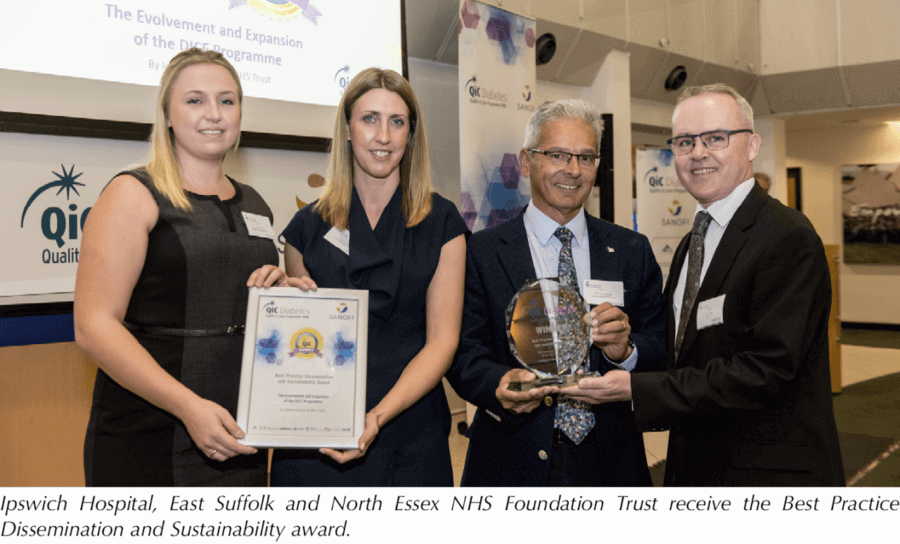
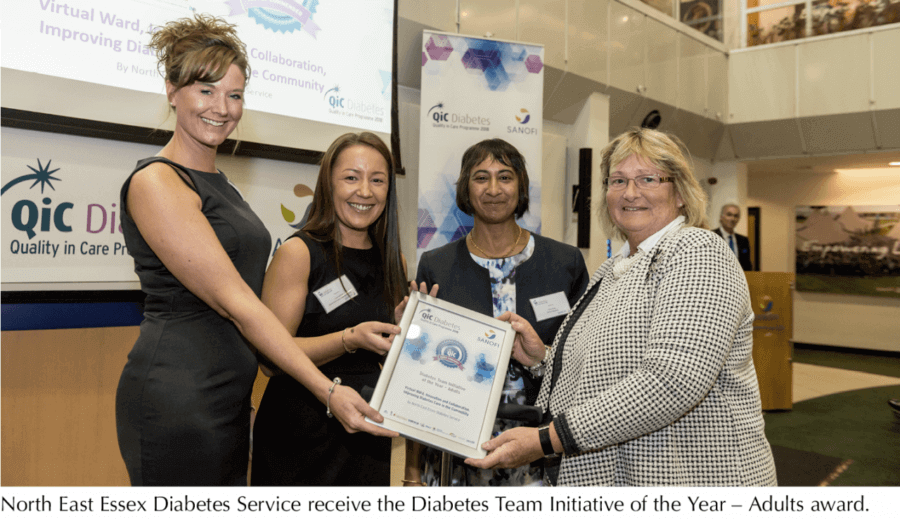
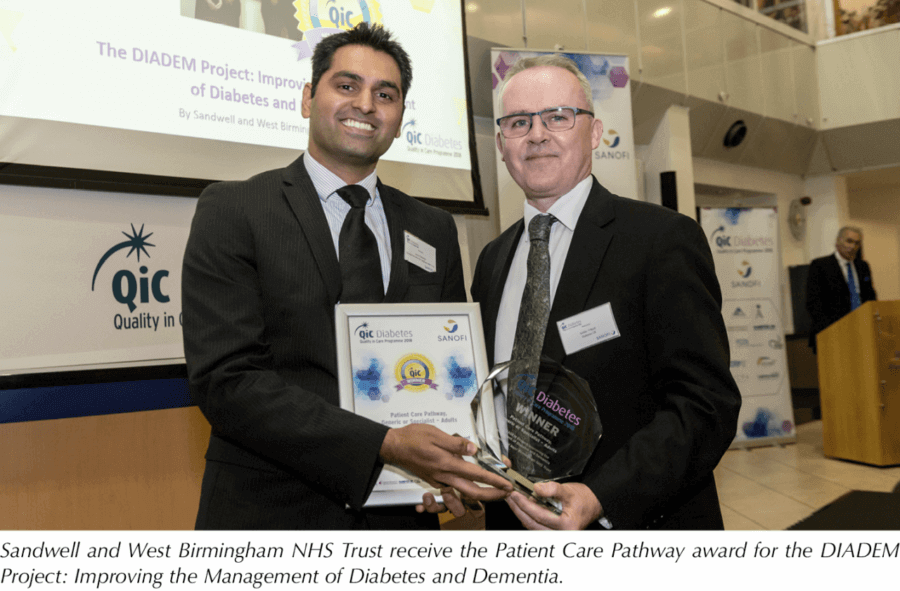
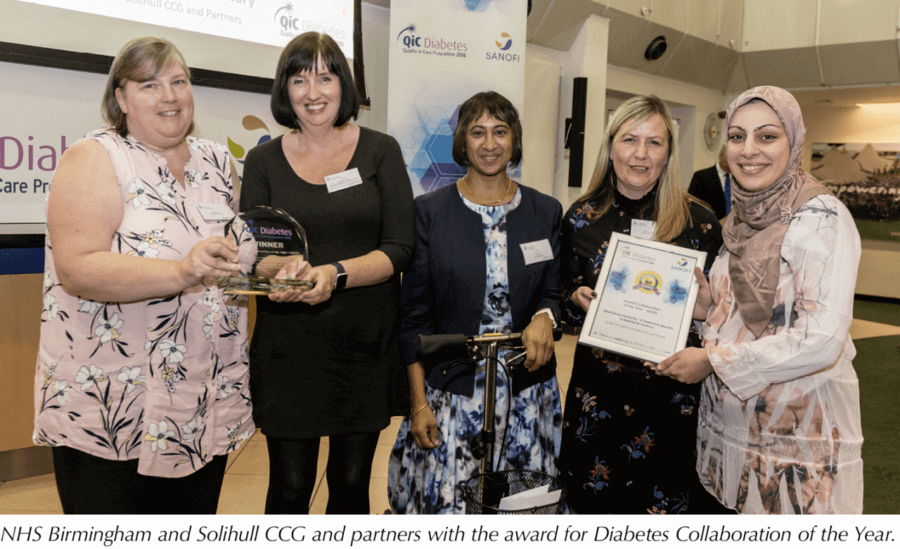
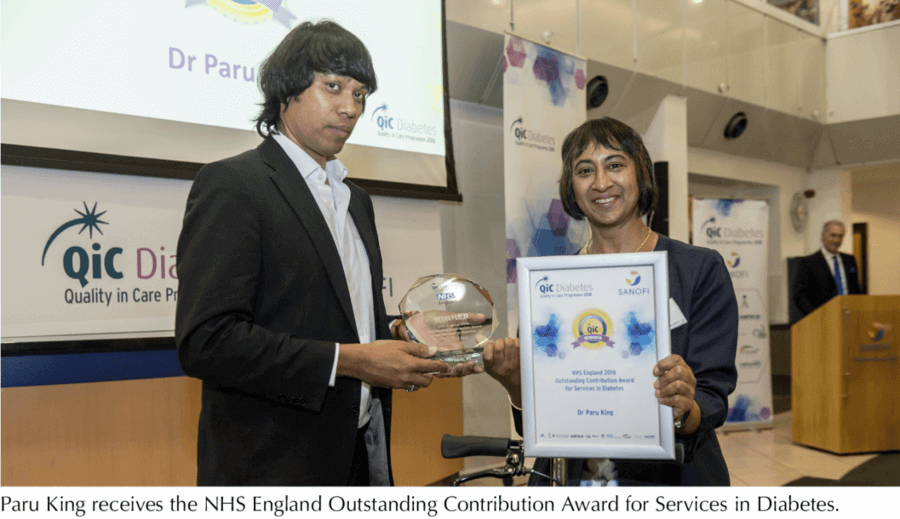

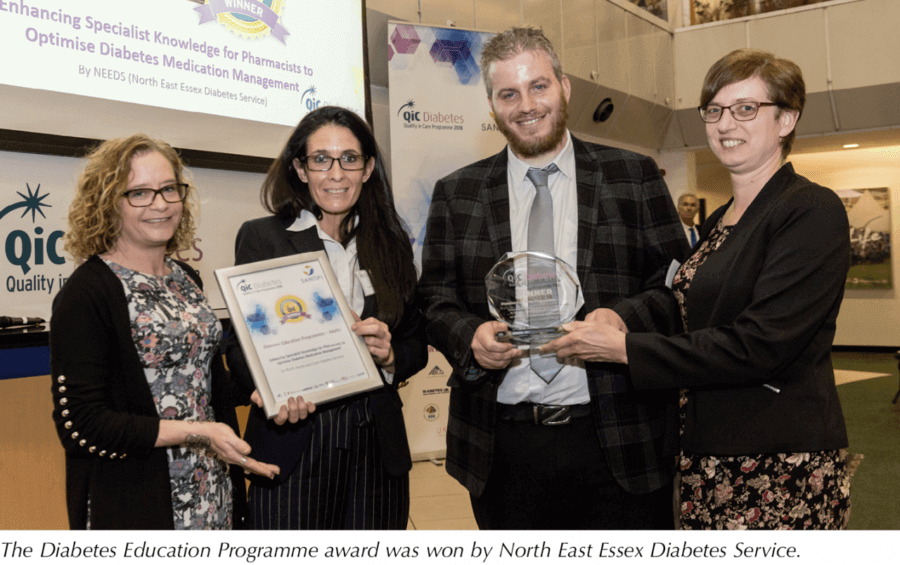
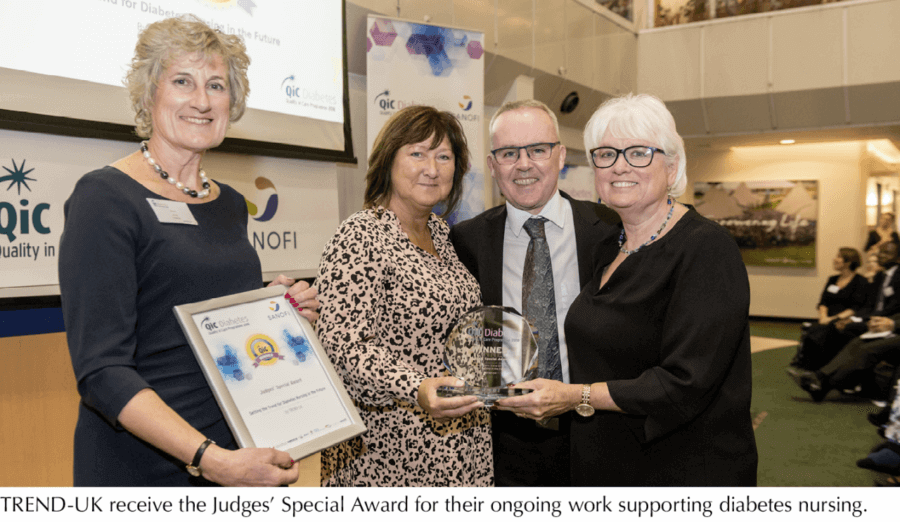
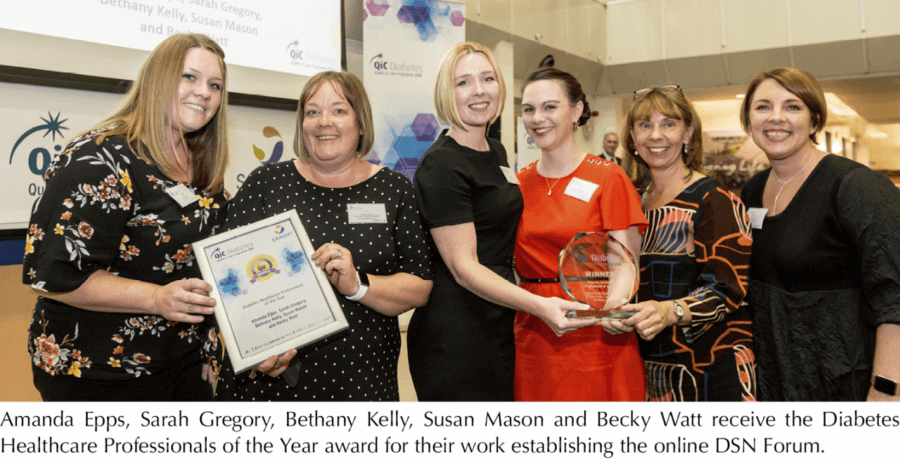
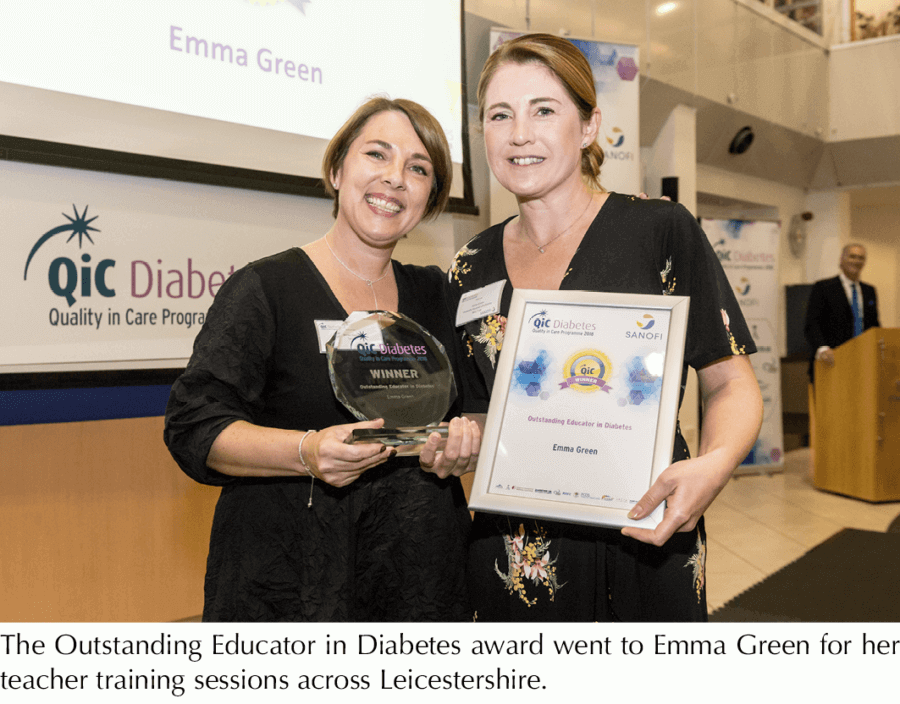
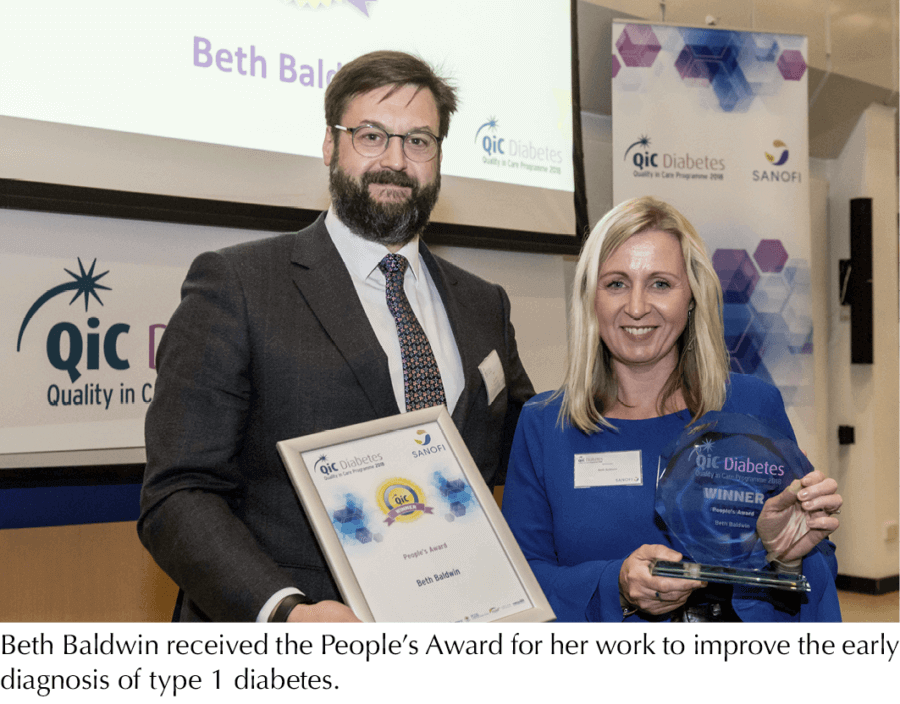





Developments that will impact your practice.
7 May 2025